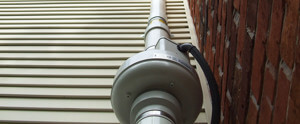Radon FAQs for Savvy Real Estate Professionals
Radon FAQs for Savvy Real Estate Professionals
By: Cherie Summa, PE and CEO of St. Louis Radon Test and Mitigation
Question #1: Why test for radon when it might kill my deal? Answer: Radon doesn’t kill deals; radon kills people. 1 in 5 homes in St. Louis and the surrounding area have a radon level at or above the EPA’s “take action” limit of 4 pCi/L (the equivalent of smoking 8 cigarettes every day) – that means 20%-25% of homes your clients buy/sell has a radon problem. Testing for radon and disclosing results to potential buyers promotes you a knowledgeable, trustworthy, and thorough professional in your field. All you need is to be armed with accurate information about radon, and to assure buyers and sellers alike that radon gas is easily mitigated by a professionally installed mitigation system, making the home safe for any occupants.
Question #2: Does the home buyer need to test the property if there is an existing mitigation system? Answer: Yes. There is no guarantee that the system was tested after it was installed. If it was tested the test results could be older than two years or the test may have been conducted improperly. If the basement has been remodeled, a sump has been added or any foundation or drainage work has been done the radon levels can change.
Question #3: Does the home buyer need to test the property if there is no basement? Answer: Absolutely. Every home should be tested for radon every two years (the U.S. EPA recommendation), regardless of whether or not there is a basement. The radon test should be performed on the first livable level of the home that is in contact with the soil.
Question #4: Should I recommend my client have the home tested for radon if other homes in the neighborhood have low radon levels? Answer: Every home is different, so you never want to rely on your neighbor’s radon test results. Even if they have an older, more historic home and the radon level is low, this doesn’t mean your client’s newly-constructed property is not at risk for high radon. The construction of each home, as well as the soil and rock beneath the home vary from property to property, affecting radon levels.
Question #5: Does the buyer or seller test for radon? Answer: Radon testing can either be done before or after the home is listed for sale. If the seller tests and mitigates (if necessary) before the house is listed for sale, it will be one less item that the buyer will question during the home inspection. If the seller doesn’t test, discuss the importance of radon testing with the buyer. Typically, the buyer will want to test the home for radon. Many times the home seller will agree to pay for the radon system, if necessary, since it is a health concern. Radon testing is inexpensive for something that can be lifesaving.
Question #6: Will the same company test and mitigate radon? Answer: Not always. It is important to check that your radon professional is certified either in their state or nationally for both radon measurement and radon mitigation (separate certifications). Often times, a home inspector will perform the initial test, and if a high radon level is found, a radon mitigator will install the system and retest to ensure its functionality.
Question #7: If my client’s home has a radon level well above 4 pCi/L, but the home has been vacant for months and sealed up, did this affect the radon levels?
Answer: Radon becomes a health hazard when it seeps into the home through cracks in the foundation or other entry points and accumulates to a dangerous level. A sealed home provides the ideal conditions for radon to accumulate, as homeowners are not opening doors and windows during that time. However, if test results are above 4 pCi/L, it is more likely that the home will have high radon when buyers move in as well.





